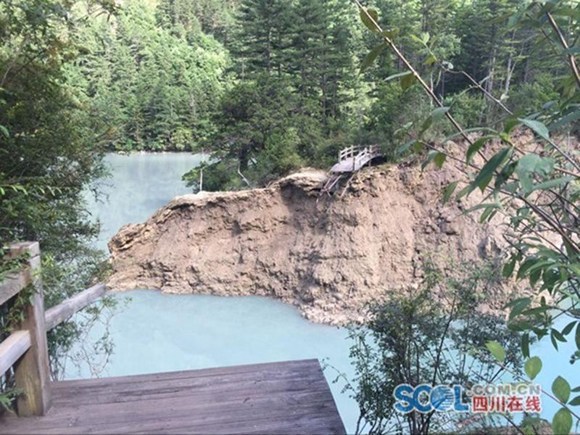Quake-hit Jiuzhaigou will regain its beauty: geologists
 0 Comment(s)
0 Comment(s) Print
Print E-mail Xinhua, August 16, 2017
E-mail Xinhua, August 16, 2017
|
|
|
The Sparkling Lake, one of the most popular scenic spots in the Jiuzhaigou National Park, was found dried up after the M 7.0 earthquake hit 3.5 km away from the valley on Wednesday, August 9, 2017. (Photo/scol.com) |
Most of the lakes in the quake-hit Jiuzhaigou National Park remain undamaged, although it may take a long time for the UNESCO World Heritage site to recover from the earthquake, geologists said Tuesday.
The national park contains around 20 tourist sites, and is known for its spectacular waterfalls, lush forest, serene plateau lakes, and karst rock formations.
A 7.0-magnitude quake rocked Jiuzhaigou County last Tuesday, and many feared the region's breathtaking scenery had been destroyed forever.
Local government previously said that Nuorilang Waterfall, one of the park's most well-known sites, had collapsed and that water had drained from Sparkling Lake. However, recent aerial images taken by drones showed that most of the lakes in the park had suffered little damage.
"Most of Jiuzhaigou's tourist sites have survived," said Li Zhiqiang, from the Institute of Geology, China Earthquake Administration.
Li said that ongoing aftershocks and possible heavy rain in the coming days may cause further damage to the vulnerable scenic sites.
The park's roads suffered significant damage from falling rocks and landslides, Li said. "Roads deep within the scenic area have been destroyed and many areas remained unreachable."
However, geologists are optimistic about nature's ability to recover from disasters.
"The lakes were originally formed by earthquakes. This quake may further alter the landforms within the region, but it can also be viewed as part of the rebuilding process," said Yin Yueping from the Ministry of Land and Resources.
A group of geologists have been monitoring possible secondary disasters in the quake-hit region and an evaluation of the ecosystem and reconstruction of the scenic area will begin soon.
"Though there is much work to be done, we are confident in nature's self-restoration capabilities. We will work with UNESCO experts to preserve our valuable heritage," said Liu Zuoming, Communist Party chief of the Tibetan and Qiang Autonomous Prefecture of Aba.
Tourism is Jiuzhaigou's primary industry. It received 7.2 million tourists, including 180,000 foreigners, in 2016, with a total tourism revenue of 9 billion yuan (1.35 billion U.S. dollars).







Go to Forum >>0 Comment(s)